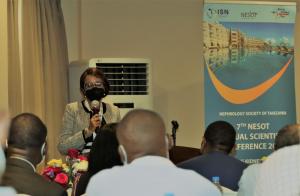Optimizing kidney care during the COVID-19 pandemic era and beyond
25-26 November 2021, Dar es Salaam: This year, the Nephrology Society of Tanzania organized its 7th scientific conference under the theme “Optimizing kidney care in the era of COVID-19”, highlighting challenges facing the health system in providing kidney care amidst the pandemic.
The Conference was officiated by the former President Jakaya Mrisho Kikwete and attended by the WHO Country Representative, Dr. Tigest Ketsela Mengestu alongside other health practitioners, public health experts and NESOT members.
Reflecting on the burden of kidney diseases in the country against the current number of kidney specialists in the country, the Guest of Honor called for further investment in the prevention and control of non-communicable diseases as the major contributor to kidney disease complications.
The prevalence of Chronic Kidney Disease in Tanzania is estimated to range between 7 and 15% with limited data on the burden of acute kidney injury and diseases. Currently Tanzania has 31 superspecialists in kidney treatment, an increase from only four (4) in 2012 when NESOF was established.
“Many people who have kidney disease lack access to care. The causes, consequences and costs of kidney diseases have implications for public health policy in all countries. The continuous efforts of the government and NESOT in advancing kidney care services are commendable and puts Tanzania at a higher chance of increasing the number of nephrologists in the African Region – which is increasing at a very slow pace”, said Dr. Tigest in her remarks.
The global nephrology workforce density currently stands at nine nephrologists per one million people. The density stands at 28.5 nephrologists per million people in the developed world, while in the developing countries the ratio of less than one (0.31) nephrologist per million.
Tanzania has made strides in building capacities for kidney services, whereby 24 regional referral hospitals provide dialysis services and to date two specialized hospitals, can conduct kidney transplantations. Formerly transplants and dialysis were referred abroad.
“We have come a long way from the situation where a diagnosis of forms of kidney disease that needed dialysis or transplants were a death sentence to many people,” said former President Kikwete.
Currently, a session of dialysis costs Tshs 250,000—300,000 (equivalent to $100-150) and a patient may need up to three sessions every week. “A service that costs 300,000/- is out of reach for many people. Low-income groups will not be able to access these services despite their availability countrywide. I call on you experts to brainstorm and propose innovative ways to make the much-needed services more affordable,” said Kikwete.
To increase number of experts in this field, NESOT in collaboration with the Muhimbili University of Health and Allied Sciences (MUHAS) and the NCD Unit of the Ministry of Health will implement a new training program for nurses specializing in care for kidney disease patients. In addition, with support from WHO and partners, the Ministry of Health will spearhead enactment of the Tanzania Organ Transplant legislation to streamline organ donation and transplantation activities in the country.




